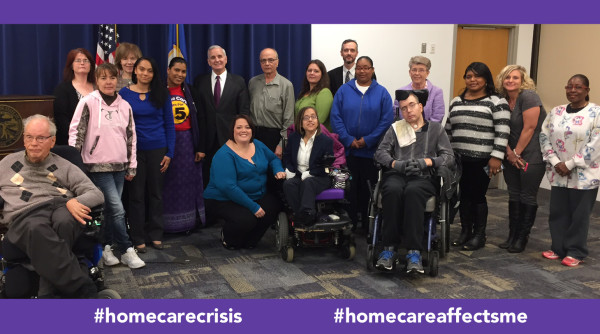

Share
Home care workers and clients who have been bargaining their second union contract with the State of Minnesota announced a tentative agreement Thursday morning. The contract would increase wages for thousands of home care workers from $11 to $13 per hour, boost paid time off and provide more training opportunities.
The tentative agreement, covering appx. 27,000 home care workers, was reached late Wednesday evening after four months of negotiations, the union, SEIU Healthcare Minnesota, announced. It still must be ratified by union members and the state Legislature to take effect.
Highlights include:
- A $2 an hour increase in the wage floor, from $11 an hour to $13 an hour
- More than $1 million in state support for home care worker trainings
- New stipends to reward home care workers for taking additional trainings that enable them to provide their clients with safer, higher-quality care
- The first holiday pay for Minnesota home care workers (many of whom provide essential care on holidays that allows their clients to celebrate with their families)
- More Paid Time Off, building on the new benefit won in their first contract in 2015
- Additional wage increases for workers providing support to clients with the highest, most complex care needs
- An online matching registry, to help home care clients find workers and to help home care workers find clients.
Jim Carlisle, a disability rights advocate who has received home care services for over 40 years, was a member of the bargaining team.
“My wife and I both rely on home care workers in our day-to-day life,” Carlisle said. “As the current care crisis has grown, we’ve seen the harm to families like ours across the state because of the lack of quality caregivers. I was proud to be on the union’s bargaining team and to have a chance to help reach this tentative agreement that would raise wages, invest in training and improve benefits to help attract and retain the quality home care workers we need now and will need even more as our population ages.”
Dawn Burnfin from Chisholm, a home care worker and mother of five who was also part of the union bargaining team, said, “This tentative agreement is a step towards fixing the care crisis we have ignored for too long, to make sure every Minnesotan gets the care they deserve.”
If the tentative agreement is ratified by union members, it would then go to the Legislature for approval. The final step would be having it signed by Governor Dayton. The negotiations took place in the months preceding the state’s legislative session in order to ensure that legislators have the opportunity to review the terms of the proposed agreement and vote on whether to ratify it, the union said.

